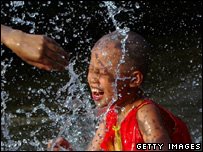
Ok, we are talking about GETTING POTABLE WATER TO PEOPLE whose lives depend on it. If we as a species cannot even accomplish that with all of the resources at our disposal then we truly do have a severe MORAL dilemma to deal with. How is it that governments can find BILLIONS of dollars to wage war, but can never seem to find what is necessary even for the most basic needs of people? And the one sentence in this article that outraged me the most was regarding young girls who cannot even get an education, because they need to spend the day fetching water for their families! We have got to as a species have that Renaissance that is so desperately needed in order for us to survive. But again, we come to the two words that seem to always put the brakes on it: human nature. Therefore, I am going to suggest something. I am going to suggest that you look up an organization of your choice that seeks to build the infrastructure necessary to provide water to those who need it and donate what you can, be it in money or word of mouth. Again, as with the climate crisis, if WE do not take the initiative to solve this problem we doom ourselves. We simply cannot look to politicians to do it for us.
Progress On Water Access Too Slow
Water access progress 'too slow'
By Imogen Foulkes
BBC News, Geneva
Some 1.6m children die each year from a lack of safe water
Urbanisation and population growth are threatening one of the UN's most ambitious millennium development goals, two UN agencies warn in a report.
The UN had hoped to halve the number of people without access to clean drinking water and sanitation by 2015.
But progress has slowed due to population increases and unexpectedly high migration to urban areas, say the World Health Organisation and Unicef.
They estimate some 1.1 billion people worldwide lack clean drinking water.
Water that is close by, clean and safe is basic to life.
Some 2.6 billion people have no sanitation and, every year, 1.6 million children under the age of five die because of such a lack of access.
And this lack is hampering the achievement of other millennium development goals.
In education, for example, young girls who have to walk miles to fetch the family's water do not have time to go to school.
Double effort required
The report by the WHO and Unicef, the UN children's fund, reveals that an additional 300,000 people would have to be provided with water supplies every day for the next 10 years to achieve the goal on clean water.
On sanitation, the goal will not be reached unless 450,000 people get services every day from now until 2015.
And, as with the other millennium development goals, sub-Saharan African is lagging behind.
A huge increase of 85% in the region's urban population has meant enormous strain on services.
The number of people without clean water in urban centres actually doubled between 1990 and 2004.
Meanwhile, many rural areas have not been reached at all.
But the UN says the report is no reason to admit defeat.
Work will continue to provide clean water, but the goals will not be reached unless the effort being made now is doubled at least.



No comments:
Post a Comment